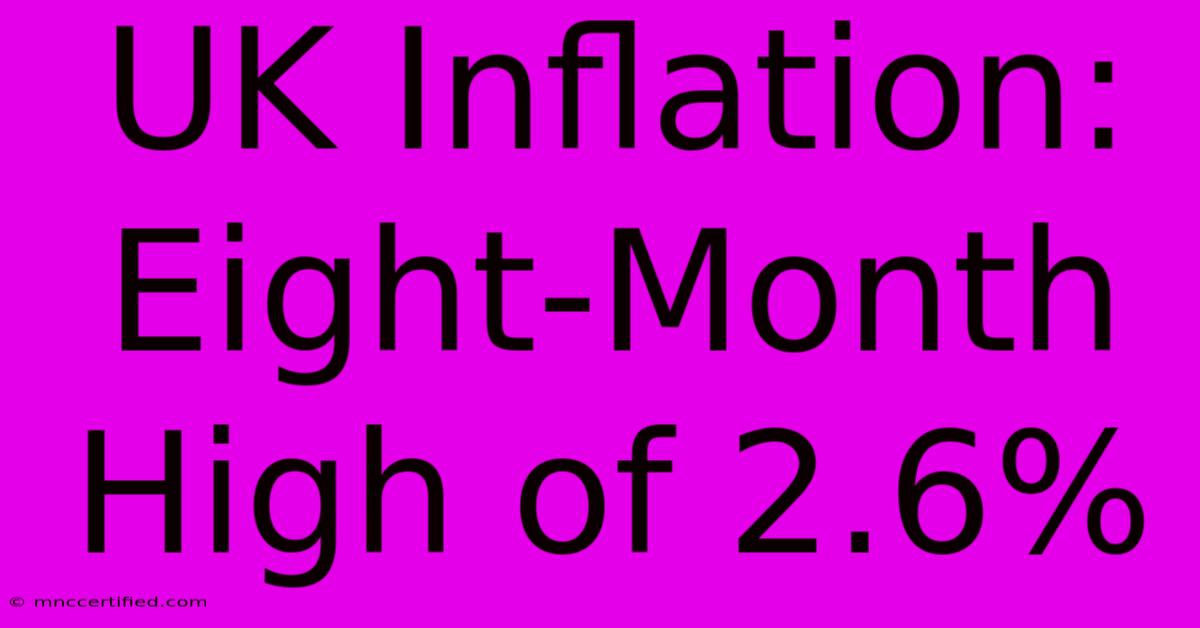UK Inflation: Eight-Month High Of 2.6%

Table of Contents
UK Inflation: Eight-Month High of 2.6% – What it Means for You
The UK's inflation rate has climbed to a new eight-month high of 2.6%, according to the latest figures released by the Office for National Statistics (ONS). This increase, exceeding economists' predictions, has sparked concerns about the cost of living and the potential impact on the Bank of England's monetary policy. This article delves into the details of this rise, exploring its causes, consequences, and potential implications for the UK economy.
Understanding the Inflation Figures
The 2.6% inflation figure represents a significant jump from the previous month's rate and marks the highest point since October 2022. This surge is primarily driven by rising food and energy prices, although a broader range of goods and services also contributed to the overall increase. Core inflation, which excludes volatile energy and food prices, also saw a rise, suggesting that inflationary pressures are broadening beyond these key sectors.
Key Drivers of Inflation:
-
Rising Food Prices: The cost of groceries continues to be a major contributor to the overall inflation rate. Supply chain disruptions, adverse weather conditions affecting crop yields, and increased energy costs for food production all play a role. This is particularly impacting low-income households who spend a larger proportion of their income on essential food items.
-
Energy Price Increases: Although energy price increases have moderated compared to the previous year, they still remain significantly higher than pre-pandemic levels. This continues to put pressure on household budgets and contributes to broader inflationary pressures throughout the economy.
-
Services Inflation: Growth in services inflation suggests that inflationary pressures are becoming more embedded within the economy. This sector is less sensitive to fluctuations in global commodity prices, indicating a potentially more persistent inflationary trend.
-
Wage Growth: While not a primary driver, moderate wage growth also contributes to inflationary pressures. Increased wages can lead to businesses raising prices to maintain profit margins, creating a wage-price spiral.
Implications for the UK Economy and Consumers
The rise in inflation has several significant implications for the UK economy and its citizens:
-
Increased Cost of Living: Higher inflation directly erodes purchasing power, making it more expensive for consumers to maintain their current standard of living. This is particularly challenging for vulnerable households already struggling with the cost of living crisis.
-
Impact on the Bank of England: The Bank of England is likely to closely monitor these figures and consider further interest rate hikes to control inflation. Higher interest rates can help curb inflation by reducing borrowing and spending, but they can also slow economic growth and potentially increase unemployment.
-
Uncertainty for Businesses: Inflation creates uncertainty for businesses, making it difficult to plan for the future and potentially leading to investment hesitancy. Rising input costs can squeeze profit margins, forcing businesses to either absorb higher costs or pass them on to consumers.
What the Future Holds: Predictions and Outlook
Economists hold varied opinions regarding the future trajectory of inflation. Some predict a further increase in the short term, while others anticipate a gradual decline as global supply chain issues ease and energy prices stabilize. The Bank of England's actions and the overall global economic climate will significantly influence the future course of UK inflation. Closely monitoring the upcoming inflation reports and the Bank of England's announcements is crucial.
Conclusion: Navigating the Inflationary Landscape
The recent eight-month high in UK inflation presents a significant challenge for both consumers and policymakers. Understanding the driving forces behind this increase, along with its potential consequences, is essential for navigating this complex economic landscape. While the future remains uncertain, staying informed and adapting to changing economic conditions is crucial for individuals and businesses alike. This requires a keen eye on official data releases, expert analysis, and proactive financial planning.

Thank you for visiting our website wich cover about UK Inflation: Eight-Month High Of 2.6%. We hope the information provided has been useful to you. Feel free to contact us if you have any questions or need further assistance. See you next time and dont miss to bookmark.
Featured Posts
-
Official Bluey Animated Movie Coming
Dec 18, 2024
-
Bellinger To Yankees Latest Rumors
Dec 18, 2024
-
Sara Sharif Case Life Sentences Handed Down
Dec 18, 2024
-
Pre Fed Meeting Sterling Drops On Inflation
Dec 18, 2024
-
Mark Cavendish Against The Odds In Cycling
Dec 18, 2024